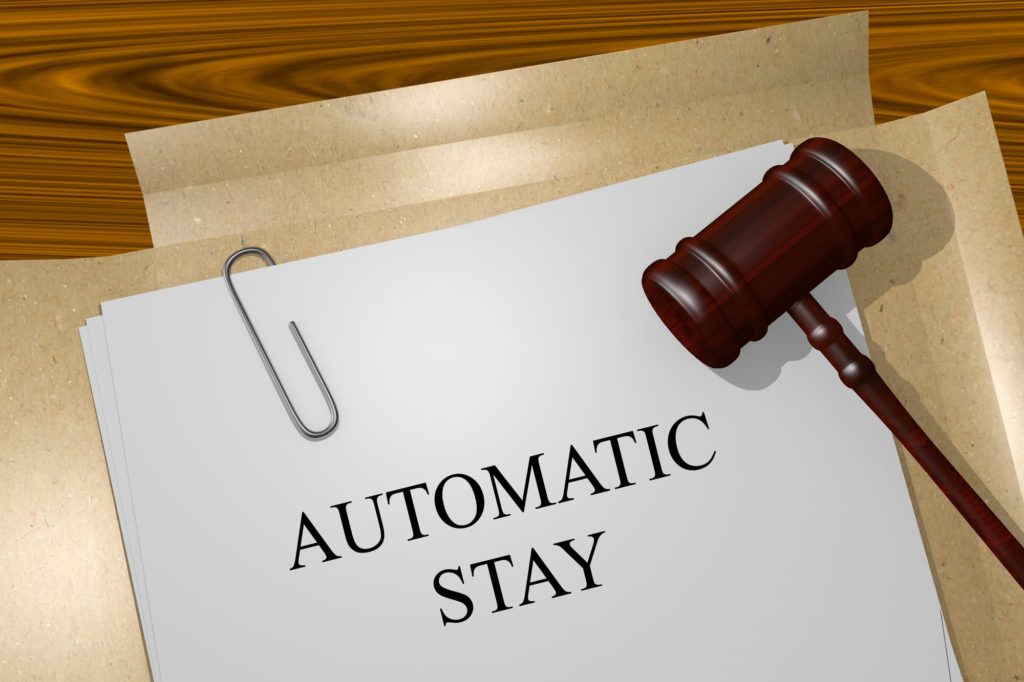Automatic Stay
What is an Automatic Stay and How is it Used?
When you file any bankruptcy case, the automatic stay immediately takes effect. I’m not overstating the truth when I say it strikes fear in the hearts of creditors. One creditor attorney told me, after I notified him that I filed my client’s bankruptcy the day before the attorney had a hearing scheduled, that he promised not to event point his car in the direction of the court house. (True story!)
The automatic stay stops all actions against the consumer debtor. It stops lawsuits, garnishments of wages and bank accounts. Also stops foreclosures and repossession, too. It will temporarily stop an eviction, but not for long.
Because of the way the law is worded, it stops all civil actions, including divorce and dissolution, so if you are involved in a family law matter and contemplating bankruptcy, be sure you are aware of this.
Stopping garnishments with the automatic stay has saved thousands of my clients form losing their cars or getting evicted from their apartments.
I’ve stopped foreclosure sales by filing bankruptcy cases literally minutes before a scheduled sale of my client’s homes. The bankruptcy automatic stay is, no doubt, a debtor’s most powerful tool when collection actions threaten harm.

Automatic Stay Exceptions
Like most things in the law, there are exceptions. If you have filed a previous bankruptcy, and it is dismissed and you file another one within the year of the first filing, the stay only lasts for 30 days. This may sound like a second bankruptcy filing might not do much for you.
Due to court’s interpretation of the way the automatic stay is written, at least in the Southern District of Ohio, the effect of the second filing is generally that the stay is honored. This arises mainly in repeat Chapter 13 case filings.
But what about a third filing within a year? Different outcome. The automatic stay DOES NOT arise, unless the debtor files a motion to impose it. This may or may not work. The debtor has to convince the court that the third bankruptcy was filed in good faith and that there have been significant changes in circumstances to warrant the imposition of the stay.
Creditors often object to these motions. They arise almost exclusively due to debtors trying to stop real estate foreclosures.
Looking for More Articles on Bankruptcy?
Looking for more insight and articles on Bankruptcy? Head over to the Bankruptcy Learning Center for more information.
Visit the Bankruptcy Learning CenterOther Exceptions to the Automatic Stay
Share This Article
Our Legal Services
Bankruptcy Learning Center
- Bankruptcy Can End a License Suspension
- Bankruptcy Individual vs Joint
- Can the Self Employed File Bankruptcy?
- Chapter 7 vs Chapter 13
- Cash Advance and Bankruptcy
- Debt Consolidation vs Bankruptcy
- Divorce and Bankruptcy
- Divorce and Chapter 7
- Divorce and Chapter 13
- Divorce Chapter 7 vs Chapter 13
- How to Keep Your Car
- How to Keep Your Pets in Bankruptcy
- How to Keep Your Property
- How You Can Loose Your Retirement
- Is Chapter 7 or Chapter 13 Better?
- Judgment Proof vs Bankruptcy
- Liens in Bankruptcy
- Military Bankruptcy
- Payday Loans and Bankruptcy
- Life After Bankruptcy
- Chapter 13 vs Loan Modification
- Short Sale vs Bankruptcy
- Small Business Bankruptcy
- Stop Lawsuits with Bankruptcy
- What is an Automatic Stay?
- What is a Bankruptcy Exemption?
- What To Do if You Lost Your Job
- What Does the Bankruptcy Trustee Do?
- Tax Debt and Bankruptcy
- The Downside of Filing Bankruptcy
- The Pros & Cons of Filing Bankruptcy
- The Truth About Bankruptcy
Useful Calculators
Here are two helpful calculators for managing your debt repayments and Chapter 13 commitments.

